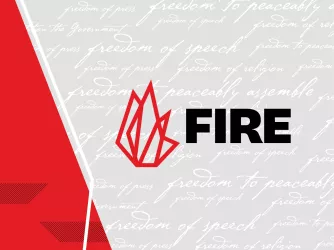Table of Contents
Jytte Klausen, Author of 'The Cartoons That Shook the World,' Speaks at Yale and Confronts One of Her Censors
The New Haven Independent reports that Jytte Klausen, whose book The Cartoons That Shook the World was censored by the Yale University Press, spoke at Yale yesterday evening, leading to a worthwhile exchange with one of the individuals responsible for the act of censorship.
Klausen, a Brandeis University professor, is having her book published by the Yale University Press this fall. The book discusses the international fury and violence that took place four years ago after a Danish newspaper published cartoon depictions of the Islamic prophet Mohammed. However, Yale University, in a move demonstrating little regard for academic freedom, decided to remove the cartoons from Klausen's book under the justification that it feared more violence and controversy might result from their inclusion in the book. The decision rightfully led to widespread criticism of the university from all corners.
In the question-and-answer session following her speech before the Yale community, Klausen had the opportunity to come face-to-face with one of the individuals who advised Yale not to publish the cartoons in her book. The Independent article describes the exchange as follows:
Asked about the specifics of the decision-making process at Yale, Klausen said that she was not privy to it. 'I can only really refer you to an interview in the Yale Daily News with John Negroponte, who was one of the first experts consulted,' she said. She quoted Negroponte as suggesting that any violence provoked by the publication of the cartoons was likely to take place in places like Kabul, Afghanistan, rather than on the Yale campus.
'I had an instant image of raging mobs in the streets of Kabul, waving my book,' Klausen joked, and the audience chuckled along with her.Klausen's joke prompted Joseph Cumming to stand and speak out. He introduced himself as one of the experts who advised Yale not to publish the cartoons. 'I'm thinking of people I know who were killed because of the publication of these cartoons,' he said. 'And I would appreciate if you would not laugh at those people and what they and their families have suffered.'
Cumming later explained that he used to direct a humanitarian aid agency in North Africa where he had witnessed anti-Christian violence firsthand.
'Well nice to meet you,' replied Klausen. 'This is not a Muslim versus non-Muslim conflict, obviously I disagree profoundly with you.'
'It wasn't actually the cartoons that killed people. Al Qaeda is in the bombing business,' she said. 'It's the bombing that comes first, it's the reasons that come second.' The audience responded with a round of applause, concluding the talk.
Klausen's response is a good one, and I applaud her for having the conviction to stand up for her beliefs.
Cumming, on the other hand, does not seem to understand how a willingness to bow before external pressure or threats—no matter how vague, speculative, or undefined—is fatal to academic freedom. It's bad enough when colleges and universities curtail free speech by giving in to students' intolerance of dissenting viewpoints and to the threat, real or imagined, of violence on campus. FIRE has seen these "heckler's veto" cases before. It's another matter when an institution such as Yale gives in to the fear created by individuals who have no affiliation with the university and are thousands of miles away. To grant these individuals the power of the heckler's veto is beyond dangerous and erodes the freedoms that we as a free society value and cherish.
I'm apparently not the only one who feels this way. As the Yale Daily News reports, the Yale Committee for a Free Press, a group of alumni, sent a letter yesterday to President Richard Levin and the Yale Corporation criticizing the decision to remove the cartoons. In pertinent part, the letter states:
The circumstances surrounding this censorship remain murky, and Yale's public explanations to date have been incomplete. Although no direct or specific threat was made against Yale, we cannot fault the University for being concerned about potential violence. But we emphatically reject the premise that freedom of the press should ebb and flow with the vagaries of threat assessments[.]
Simply stated, Yale must not be the arbiter of what is 'safe' to publish. Such censorship corrodes the intellectual freedom that is the foundation of the entire university community. It also violates Yale's own explicit policy: 'Above all, every member of the university has an obligation to permit free expression in the university. . . . Every official of the university . . . has a special obligation to foster free expression and to ensure that it is not obstructed.' (Emphasis added.)
If only more people at Yale possessed the same courage and conviction.
Recent Articles
Get the latest free speech news and analysis from FIRE.

Introducing the SPFI Sentinel: Free speech stories by — and for — student journalists

Why YouTube caving to Trump is cowardly

FIRE statement on the White House’s Compact for Academic Excellence in Higher Education
